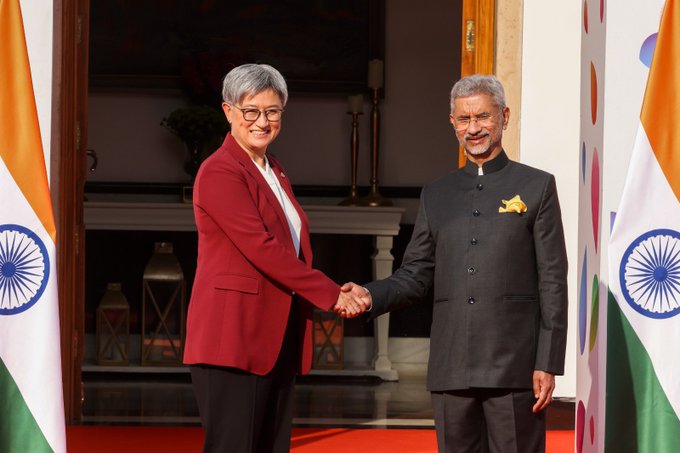India will be participating in the forthcoming 7th edition of the Indian Ocean Conference in Perth later this week. External Affairs Minister S Jaishankar will be heading there to attend the conference and posted this X (former Twitter).
The two-day conference is being organized by India Foundation in association with the Ministry of External Affairs, Department of Foreign Affairs and Trade, Government of Australia, S Rajaratnam School of International Studies, Singapore and Perth USAsia Centre on February 9 -10, 2024, in Perth, Australia.
The theme for this edition is “Towards a Stable and Sustainable Indian Ocean”, and is expected to bring together key stakeholders to chart the roadmap for strengthening regional cooperation.
It was announced by Australian Foreign Minister, Penny Wong, last year that Australia will host the Indian Ocean Conference 2024.
What did EAM post on X?
Ahead of his visit, Jaishankar met Australian High Commissioner to India Philip Green on Friday and discussed the bilateral partnership between the two countries.
“Glad to meet Australian High Commissioner Philip Green this afternoon. Spoke on the next steps in the India-Australia partnership. Look forward to my forthcoming visit to Perth for the Indian Ocean Conference 2024,” Jaishankar posted on X.
The Indian Ocean Conference started in 2016 in Singapore featuring 30 countries. The sixth Indian Ocean Conference was held in Dhaka, Bangladesh in May last year. And in the last six years, the Conference has emerged as a consultative forum for countries in the region over regional affairs.
About the Indian Ocean Conference
India and Australia’s collaboration in the India-Australia 2+2 Defence and Foreign Ministerial Dialogue in 2023 marked a significant milestone in their diplomatic ties. The co-chairing by Defence Minister Rajnath Singh, External Affairs Minister S Jaishankar, Australian Deputy Prime Minister and Defence Minister Richard Marles, and Australian Minister for Foreign Affairs Penny Wong reflected a joint commitment to strategic discussions.
The Indian Ocean Conference has traversed diverse locations, emphasizing its commitment to inclusivity. The 6th edition in Dhaka, Bangladesh, showcased a remarkable lineup of leaders and experts, reinforcing its role as a premier forum for dialogue. The upcoming conference in Perth, Western Australia, not only extends this legacy but also places emphasis on the region’s geopolitical and economic dynamics.
Perth, as the chosen venue, brings a unique perspective due to its significant Indian Ocean location and its distinction as Western Australia’s largest city. With a substantial Indian-origin population, Perth serves as a bridge between Australia and India, fostering cultural exchanges and economic collaboration.
The involvement of the Perth USAsia Centre in the conference highlights Australia’s strategic importance in the Indian Ocean region. As a center focused on geopolitical and strategic studies, its contributions to the discussions are expected to provide valuable insights into the evolving dynamics of the region.
Perth, Western Australia: Why is it important for India?
In the context of India’s diplomatic engagements, the visit of Deputy Premier Rita Saffioti to Delhi and Chennai showcased a commitment to strengthening ties with Western Australia. The focus on key sectors such as trade, tourism, and aviation underscore the multifaceted nature of the relationship.
Discussions with key aviation stakeholders and business representatives during the mission aimed at exploring opportunities for collaboration and enhanced connectivity in the aviation sector. Minister Saffioti’s meetings with the Chairman of TATA, India’s largest conglomerate, further highlight the potential for partnerships that extend beyond geographical boundaries.
The emphasis on Western Australia’s abundance in critical minerals and its potential as a major producer of renewable energy aligns with India’s goals for sustainable development and clean energy transition. The Australia-India Economic Cooperation and Trade Agreement (ECTA) emerges as a catalyst, reducing tariffs and facilitating trade in goods and services between the regions.
Significant Projects, such as Project Ceres and the Mt Celia Project, exemplify the tangible outcomes of collaboration, creating opportunities for growth in the supply chain. The awarding of contracts and the establishment of the first gold mine in Western Australia contribute to the economic synergy between the regions.
India’s position as Western Australia’s 10th largest trading partner underscores the economic significance of their partnership. The tourism sector, a key focus during Deputy Premier Saffioti’s mission, stands as a testament to the growing people-to-people ties, with Indian visitors contributing significantly to Western Australia’s economy.

